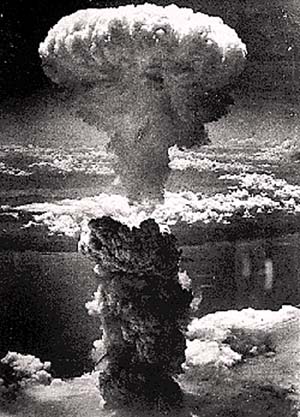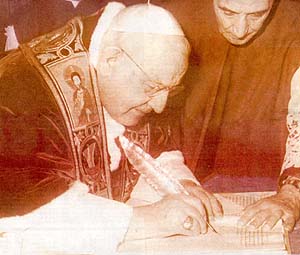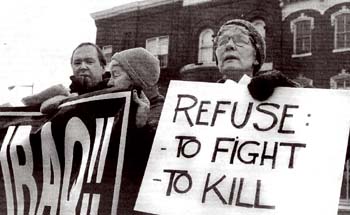 |
War against Terrorism
Moral Criteria for Just War... - Part III
The Traditional Teaching Prevails for a
Possible Nuclear War
Atila Sinke Guimarães
Different approaches have been taken regarding nuclear weapons and their influence on the moral rules for waging war. Notwithstanding, the same traditional teaching continued to govern until the last days of Pius XII. It was only with the election of John XXIII and hegemony of the progressivist current in Vatican Council II that a new approach was introduced, one that was opposed to the previous coherent teaching.
The traditional Catholic position
From after Hiroshima and Nagasaki until the end of his pontificate, Pius XII took a serious and balanced position regarding the two World Wars, including the introduction of the nuclear weapons. Dealing specifically with the topic of the threat of using atomic weapons he affirmed:
“It is certain that even in the present day circumstances war cannot be considered illicit for a nation to efficiently defend itself and achieve victory when it is attacked unjustly and all efforts to avoid it have proved futile.” (1)
1. Pius XII, Christmas Allocution of 1956, L’Osservatore Romano, December 24-25, 1956. Under the threat of atomic, chemical, and bacteriological destruction, the principle of the legitimate defense of a State is also recognized by Pius XII in his Allocution of April 18, 1954, L’Osservatore Romano, April 19-20, 1954.

Pius XII confirmed the State's right to nuclear defense. Above, a mushroom cloud rises over Nagasaki in 1945 |
In essence Pius XII applied the same moral principles that governed the two previous phases to the new situation. That is, he desired and prayed for disarmament and peace, he condemned the abuses and bad actions inevitable in almost all war, but he clearly admitted the need for States to punish international crimes and to defend themselves against unjust attacks. In one of his most direct speeches on the topic, he set out these conditions for the punishment of international crimes:
“Here we will consider only the especially grave crimes, the most serious. Only for them is it possible to make a uniform Penal Law for States. In addition, the selection and limitations of the crimes to be punished must be based on objective criteria: the gravity of the crime and the need to act against it. With regard to these two aspects, it is decisively important to take into consideration the following:
• The value of the goods damaged ….;
• The force of the attack that damaged them;
• The intensity of the bad will displayed when the crime was committed;
• The degree of malice in the offender ….;
• The gravity of the menace weighing over the juridical order due to extraordinary circumstances, which, on one hand accentuate the danger of criminal actions and, on the other, make them more frightful in their effects.
“Based on these criteria, a series of facts can be cited that should bear on an International Law. First, there is the modern war, which does not exclude the unconditional need to defend oneself and which brings – we can say without hesitation – devastation, suffering and unimaginable horror …. If threatened, peoples want to protect their existence and their most valuable goods …. they have to defend themselves. The right to defend itself cannot be refused, even today, to any State.” (2)
2. Pius XII, Allocution to the members of the International Congress of Penal Law, October 3, 1953, L’Osservatore Romano, October 4, 1953
The following excerpts by known Spaniard theologian Fr. Antonio Peinador, CFM, reflect the common non-pontifical teaching of the pre-Vatican II Church, which was in perfect accord with the Papal Magisterium. Writing after the atomic explosions in the Japanese cities, Peinador firmly stated:
“It is false that war is an intrinsic evil. Besides, neither today’s war nor future ones are necessarily evil. Not even the very grave damages that follow from present day wars, or the excesses commonly committed, makes them necessarily illicit. Therefore, lest war be banned, either today or in times to come, it is necessary that it be pronounced that war is a unique measure for restoring true peace.” (3)
3. Antonio Peinador, Cursus brevior Theologiae Moralis, Tract. 3, De caritate, q. 4, chap. 3, a. 2, C, q. 2 (Madrid: Aedes Typographica de Ocana, 1950), vol. 1, p. 327.
To the modern war Peinador did not hesitate to apply the traditional criteria. He taught:
“It is clear that the just war is only materialiter [in the way it appears] opposed to peace, insofar as in it mutual enemies fight among themselves. Moraliter [morally], however, it is not opposed to peace, nor therefore to charity, because it is the necessary means to procure peace by vanquishing the enemies of peace, who are the ones who attacked the good order of the offended nation.
“Therefore, those who wage just war, said St. Thomas, intend peace; and so, they are not opposed to peace, except for that evil peace which Our Lord ‘did not come to establish on the earth.’ Hence Augustine said to Boniface: ‘Peace is not sought so that war might be waged; but war should be made so that peace may be obtained. Therefore, even while waging war, seek peace, so that by conquering those whom you fight against, you may lead them back to the advantage of peace’ (St. Thomas, II,II, q. 40, I, ad 3; St. Augustine, Epistola 189 ad Bonifacium, n. 6).” (4)
4. Ibid., p. 309, footnote 4.
These texts by Pius XII and Peinador reflect the perfect and balanced position that the Catholic Church has always taken regarding war. It is a fearless, noble, and charitable position. Following the law of charity, the Catholic Church measures the entire danger the war represents to peoples, she wishes and prays for peace, she tries to attenuate the suffering caused by the war, she seeks all the reasonable opportunities to stop the fighting, but she never denies the principles of justice due to nations regarding their rights and their self-defense. Justice and charity are two opposing virtues that should be present in any war. They live in perfect harmony in the Holy Church.
The progressivist utopia
The election of John XXIII and the meetings of the Ecumenical Council Vatican II marked the establishment of Progressivism in the Catholic Church.

The Church's position on war changed after the Council. Above, John XXIII signs the papal bull opening Vatican II - The Tidings, October 11, 2002 |
Movements that until then had been living clandestinely rose to the surface, and their orientation, before condemned by the Church, became the official line of the Vatican. Everywhere radical changes were made. The position of the Church regarding war also was completely modified. The constant teaching on just war was abandoned and replaced by the clear design to abolish war on earth – all wars. The presence of nuclear weapons in the panorama made it easier for Progressivism to promote its utopia of peace. Let me point out several landmarks of this change.
After the first session of the Council and some months before his death, John XXIII signed the Encyclical Pacem in terris. In it he stated:
“Men nowadays are becoming more and more convinced that any disputes which may arise between nations must be resolved by negotiation and agreement, and not by recourse to arms. We acknowledge that this conviction owes its origin chiefly to the terrifying destructive force of modern weapons. It arises from fear of the ghastly and catastrophic consequences of their use. Thus, in this age which boasts of its atomic power, it no longer makes sense to maintain that war is a fit instrument with which to repair the violation of justice.” (5)
5. John XXIII, Pacem in terris, nn. 126-127, Vatican Internet Site, official English version.
With these words, the Pope declared that after atomic weapons entered the picture, there could be no more just war. This was the first great progressivist blow against the traditional doctrine on war.
How can war be avoided from now on? John XXIII offered a romantic goal: men should trust men. To resolve all the complicated international problems and quarrels, the solution he presented is just this: men should trust men! It is a quite naïve opinion to appear in an encyclical of a Pope, but in fact it was written as follows:
“Everyone, however, must realize that, unless this process of disarmament be thoroughgoing and complete, and reach men’s very souls, it is impossible to stop the arms race, or to reduce armaments, or – and this is the main thing – ultimately to abolish them entirely. Everyone must sincerely cooperate in the effort to banish fear and the anxious expectation of war from men’s minds. But this requires that the fundamental principles upon which peace is based in today’s world be replaced by an altogether different one, namely, the realization that true and lasting peace among nations cannot consist in the possession of an equal supply of armaments, but only in mutual trust.” (6)
6. Ibid., n. 113.
The wise prudential norms of Pius XII to judge and punish international crimes, presented above, clearly indicate that such crimes are not rare among nations. One senses his words are firmly based on reality. On the contrary, reading John XXIII’s statement, one feels in the presence of a dream, a romantic counsel, or an attempt to impose a utopia. In fact, it is difficult to believe that John XXIII was speaking seriously when he counseled all nations to renounce their rights to arms and possessions of munitions without any other guarantee than trust in their neighbors. This counsel shows the influence of the progressivist utopia on the spirit of the Pontiff. But John XXIII was not the only one to believe in this dream.
During the last session of the Council, October 1965, Paul VI visited the United Nations headquarters in New York. The climax of his speech on that occasion affirmed the position that war must be abolished:
“And now our message reaches its apex. First a negative word: it is the word you are expecting from us and we pronounce it conscious of its gravity and solemnity: never again one against another, never, never again! Isn’t this the main goal for which the United Nations was founded? …. There is no need of a long discourse to proclaim the supreme aim of your institution. It is only necessary to recall that the blood of millions of men, unheard of and numberless sufferings, useless massacre, and terrifying devastations sanction the pact that unite you in an oath that must change the future history of the world: Never again war, never again war!” (7)
The utopian dream of a history without war was stressed again a little further in Paul VI’s message:
“Will the world ever change its individualist and bellicose mentality, which until now has made up a large part of its history? It is difficult to predict. But it is easy to affirm that we must move ahead decidedly toward a new history, a pacific history, which will be completely human, the one that God promised to men of good will.” (8)
7. Paul VI, Speech to the U.N. Assembly, October 4, 1965, "La visita di Paolo VI alle Nazioni Unite," Libreria Editrice Vaticana, 1966, pp. 63-64.
8. Ibid., p. 65.
These revolutionary initiatives of John XXIII and Paul VI regarding war encouraged numerous Prelates to pursue and develop this line of thinking on the topic. I report here some of the most significant speeches taken from chronicles of Vatican II. It is not inconsequential that these speeches were made only a few days after the one Paul VI delivered to the U.N.
Cardinal Achille Liénart, Bishop of Lille and a member of the Board of Presidency at Vatican II, defended this new concept of “no war ever” in a speech to the conciliar Assembly:
“Concerned about the signs of the time, the Church understands that her doctrine and activity have to extend themselves in a broader way. In fact, today there are new and terrible weapons that not only can kill the combatants, but also destroy cities, peoples, immense regions, and even the whole earth. To cause such destruction would be a crime against God, Creator and Father of men, and against humanity. Therefore, the distinctions between a just and unjust war are no longer sufficient; we must also consider the means employed in them. While the use of arms is permitted to establish justice, how can this be achieved through inhuman means? Wouldn’t it be an injustice today to initiate an offensive war, even a legitimate one, since it uses these arms?
"Therefore, the time has arrived when men must stop defending their rights, even the legitimate ones, by means of weapons. They must consider attentively the injustices suffered by peoples because of wars and with a sense of justice and fraternity must exert themselves to arrive at a just solution.” (9)
9. Achille Liénart, Speech to the Conciliar Assembly, October 6, 1965, apud Boaventura Kloppenburg, Concílio Vaticano II (Petrópolis: Vozes, 1966), vol. 5, pp. 221-222.
According to Liénart, the potential nuclear danger would be enough to set aside the previous Catholic doctrine on war. Two elements seem to be behind his position: a disproportionate fear of atomic war and a utopian desire to create a new world where all men live together in peace forever, without God.
Inspired by a similar panic of nuclear weapons, Cardinal Paul Léger, Archbishop of Montreal, designated war as a means to restore violated rights as “irrational”:
“Today the reality has changed in such a way that one could hardly judge all the aspects of war following the rules of classical theory. The number of victims, the extent of the destruction, the damage caused by the arms, etc., have given a new figure to violence. Now then, since the reality has changed in such a way, the classical theory on the morality of war has become almost unrealistic and inapplicable …. In practice it has become irrational to consider modern war as a useful and licit instrument to re-establish violated rights .… The total war, whatever arms it might use – nuclear, conventional, chemical, or bacteriological, must be rejected absolutely. There is no way to absolve the human conscience for the use of such weapons, since their use is intrinsically perverse.” (10)
10. Paul Léger, Speech to the Conciliar Assembly, October 6, 1965, apud ibid., pp. 221-223.
 |
Anti-war protesters induce soldiers to betray their country, inspired by a new thinking on war introduced by Vatican II
The Tidings, February 21, 2003 |
The Canadian Cardinal was not content to deny past Catholic doctrine on the war, he felt the need to qualify it as “intrinsically perverse.” This would be, then, his judgment on the above mentioned teachings of Pius XII on the topic. Léger harvested another important fruit of his thesis. He went on to attack the sovereignty of nations as an “anachronism,” since it supposes war as a defense:
“Humanity is in a vicious circle, a consequence of depravities inherited from a sad past. It is necessary to create a new human order that answers to new world conditions and excludes all resource to any kind of war …. New political customs have to be instituted …. This profound change demands the cooperation of all of us …. Responsible leaders in the political and economic spheres must move beyond an antiquated nationalism and a materialist ideology to consider the common universal good of all humankind …. It would be very useful to strongly affirm the anachronistic and dangerous character of any political theory that gives absolute rights to the State, placing it outside subordination to an international authority.” (11)
11. Ibid., pp. 223-224.
Therefore, the end of the sovereign nation and its dependence on a pagan international power are presented by a Cardinal of the Holy Church as a means to avoid war. This is indisputably another element of the progressivist utopia. Speaking before the conciliar Assembly, Archbishop Joseph-Marie Martin of Rouen, France, presented the Catholic doctrine on just war as “obsolete”:
“The distinction between offensive and defensive war, even if it is theoretically correct, is entirely fragile and insufficient if we consider the calamities threatening humanity. Further, this distinction puts us in a vicious circle, where the bad will of one party gives the right to the other to arm itself. Following this path we go to the arms race and balance of terror. The distinction between just and unjust war is completely obsolete today: we cannot speak of war anymore as past theologians used to do, since the modern ‘total war’ was unknown by them. We are no longer dealing with mutual aggressions; rather, the very existence of the world is what is endangered. Therefore, war – any war – must be condemned as a means to resolve international problems. War is a word that must be abolished from men’s vocabulary and customs.” (12)
12. Joseph-Marie Martin, Speech to the Conciliar Assembly, October 7, 1965, apud ibid., pp. 232-233.
This Prelate went further than Paul VI when he demanded the word war be abolished from the human vocabulary and customs. Quite extreme, Archbishop Martin! His predictions, furthermore, have not been verified in the last 40 years. Reading his statements today, some distance of time from when he made them, one can easily figure out his real reasons for the speech. He wanted to give support to the same platform Paul VI had presented some days before at the U.N., stimulate an unbalanced panic of nuclear war, and fuel the progressivist dream of imposing a utopia on humankind.
Archbishop Paul Gouyon of Rennes, France, made a similar statement to the Council:
“There is no longer any cause that can justify a war. A war, even a limited one, could produce reactions capable of provoking the total war. Any nation that declares a war for whatsoever motive must be condemned by the universal conscience …. The condemnation of any nation that will take the initiative of war must be reinforced by an action that grants real and effective powers to an international authority.… The nations must …. gradually and simultaneously hand over their military arms to such an international organization.” (13)
13. Paul Goyon, Speech to the Conciliar Assembly, October 7, 1965, apud ibid., pp. 236-237.
Archbishop Gouyon wished, therefore, to transform sovereign nations into soviets, groups without autonomy relying on a supreme soviet to defend their own individual rights. This almighty communist organ would be the United Nations. Bishop Alfred Ancel of Lyon, France, provided more details about the despotic role desired for the universal government:
“Today the common good of humankind demands that all nations in common accord renounce the right to wage war …. It is necessary to create a supreme international authority with effective means to require that all should renounce the right of war. This authority, according to the rules of justice, should be the arbiter of differences among nations. It should also impose on all a gradual reduction of arms until they have been definitively suppressed. Finally, it should pressure or efficaciously punish those who in any way would disturb the international peace.” (14)
14. Alfred Ancel, Speech to the Conciliar Assembly, October 8, 1965, apud ibid., pp. 246-248.
It seemed to me that these speeches, along with the statements of the conciliar Popes, needed to be exposed to confirm the progressivist ideal and plan that lurk behind the scenes on the topic of war. The ideal is: never again war. The plan is to use the excuse of changed circumstances in war to justify doing away with the traditional Church teaching on the topic.
In the Pastoral Constitution Gaudium et spes, the norms the Council gave for the topic of war (nn. 77-84) were confused. Reading them, an enthused progressivist can find confirmation for his utopia; a naïve conservative can find a reaffirmation of the principle of legitimate defense; an objective analyst will find an ensemble of contradictory statements. Therefore, at depth, the official document of Vatican II is useless on this matter for either progressivists or conservatives.
John Paul II visited the U.N. headquarters in New York twice, once on October 2, 1979 and again on October 6, 1995. The dates were chosen to commemorate respectively 14 and 30 years of Paul VI’s visit to the same place. (15) JPII’s line of conduct remained the same as that of John XXIII and Paul VI.
15. Those visits were analyzed in my small work The Universal Republic Blessed by the Conciliar Popes, Los Angeles: TIA, 2002, (available from Tradition in Action).
In short, based on the danger of nuclear weapons, the progressivist position defends:
• The end of the bi-millenary Catholic doctrine on just war;
• The end of war – any war and forever;
• The end of the sovereignty of nations;
• The establishment of a universal government to govern dependant members;
• The complete disarmament of present day nations;
• The establishment of an almighty military corps under the command of the universal government;
• the imposition of peace – by law or force – on all members.
These are the points that are explicitly defended by the progressivist religious authorities I quoted. They characterize the new utopia that is being pushed forward. There is no mention of God in this new world order, no mention of the Catholic Church as the sole source of truth, just the dream of a Universal Republic that will correspond to a ghostly Pan-Religion, which is trying to be installed simultaneously.
Another important practical consequence of this exposé is to clearly show what is inspiring present-day Vatican representatives – both the Pope and high-ranking Prelates – when they speak about war and peace, as they did recently regarding the war with Iraq. Their condemnations of the war are not based on the traditional concept of the just or unjust war. They consider any war unjust a priori, by the simple fact of being a war.
Those who supposed, therefore, that John Paul II was applying the principles of justice to the recent war to arrive at its condemnation are absolutely misguided in their thinking. He was following the same progressivist orientation of John XXIII and Paul VI in their attempts to bolster a utopia of peace and a Universal Republic. This explains the Pontiff’s strong opposition, since the war set aside, at least for a while, both dreams.
Posted June 7, 2003

  |
This argument is developed in Guimarães’ book War, Just War

|
Part 1 | Part 2 | Part 4
War | International Affairs | Hot Topics | Home | Books | CDs | Search | Contact Us

© 2002- Tradition in Action, Inc. All Rights Reserved
|
 |
|